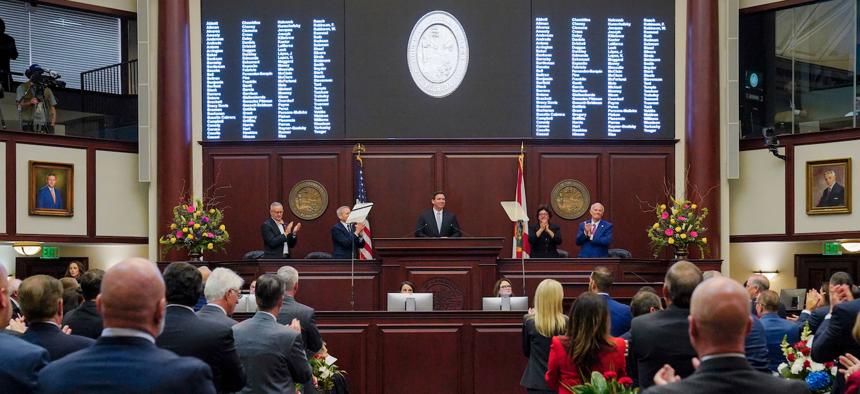Policy
Five bills Florida's business community is focused on this session
Legislation that Big Business has an eye on covers data privacy, health care access and more.

Gov. DeSantis delivers the State of the State address at the Florida State Capitol in Tallahassee, March 7, 2023. Photo by CHENEY ORR/AFP via Getty Images
One of Florida businesses’ big asks this session sailed through the Florida Legislature already: tort reform.
That legislation (HB 837/SB 236), which among other things makes it harder and more expensive to sue insurers and other companies, eliminates one-way attorney’s fees and makes a host of other changes, was signed into law by Gov. Ron DeSantis well before the session’s halfway point. The new law is controversial, garnering criticism from some fellow Republicans, including former President Donald Trump.
Related coverage – After tort reform, Morgan & Morgan declares war on defense lawyers, their clients
The law’s passage marks a significant win for Florida’s corporate community, which enthusiastically backed the bill. One of the legislation’s biggest backers was the Associated Industries of Florida (AIF), the trade group whose political activities receive most of its funding from some of Florida’s largest corporations, like Disney and Florida Crystals.
The tort reform bill is far from the only legislation that AIF and the big businesses that call Florida home are focusing on: Lobbyists for AIF have registered to speak for or against over 50 bills.
Here are five measures that AIF and corporations like Meta, Florida Power & Light and more are championing (or fighting against) this session, which is slated to end May 5:
Technology Transparency (HB 1547/SB 262)
This legislation, which seeks to give Floridians more control over their personal data, is being heavily lobbied against by big Florida and national business interests. Based on a 2018 California bill, it would allow consumers to opt out of targeted advertising and adds several regulations to tech companies that operate in Florida that have more than $1 billion in revenue or make 50% of their revenue from targeted advertising.
While the legislation has gotten unanimous committee approval at its stops so far, some of the country's largest corporations are currently lobbying against it. Lobbyists representing Apple, Meta, and State Farm are all registered on the bill.
AIF also has lobbied against the bill. In one of the organization’s weekly legislative updates, they wrote that the bill places “onerous regulatory burdens” on Florida businesses and reduces the effectiveness of online advertising.
Republican state Sen. Jennifer Bradley said during a committee hearing on the legislation that it is all about increasing consumer protection. “It gives the Florida consumer the right to know what type of information the company collects, sells or shares about them. It gives the consumer the right to delete or correct the information. It gives the consumer the right to opt out of their information being sold or shared,” she said.
The bill now is awaiting its final committee approval in both chambers.
Telehealth Practice Standards (HB 267/SB 298)
Several Florida medical associations and companies have pushed for a bill that will further expand the growing telehealth industry.
This legislation expands on last year’s measures that permitted doctors to prescribe medication via telehealth, such as a video call on a smartphone or laptop. Under this year’s legislation, prescriptions would be able to be made by audio only, permitting doctors to prescribe medicine with only a phone call.
The bill has been lobbied by groups such as the Florida Medical Association and Florida Society of Anesthesiologists, and companies like Advent Health, BayCare, Meridian Health Services Network and Moffitt Cancer Center.
Telehealth usage shot up in Florida during the COVID-19 pandemic and still remains more frequently used than the pre-pandemic period. This industry has also maintained its boom nationwide, going from a national industry size of about $8 billion in 2019 to over $30 billion today.
The legislation is now waiting for its final committee stop in both chambers.
Broadband Internet Service Providers (HB 1221/SB 626)
Legislation aimed at increasing broadband expansion in Florida’s rural communities has also drawn the attention of Florida business interests.
Bills under consideration grant Florida’s 18 rural electric cooperatives the right to add broadband onto their services, but subject their utility poles to the same state regulations as poles owned by investor owned utilities like Florida Power & Light are.
That would allow not just the rural electric cooperatives, but companies like FPL to enter into agreements with the cooperatives to bring broadband to those communities. AIF, FPL, the Florida Electric Cooperatives Association and several state municipalities have lobbied for the legislation.
This comes as increased federal and state funding has been allocated to increase internet access in Florida, including $400 million through Florida’s Broadband Opportunity Program and $248 million under the federal American Rescue Plan.
AIF said it supports the bill because it is required for the growth of businesses across Florida. “Broadband expansion is most critical, in the 21st century, for businesses operating in rural communities with limited access to the internet so they can have the tools necessary to provide for their customers,” the group said.
The bill passed the Florida House unanimously and is now waiting on a Senate floor vote.
Local Ordinances (HB 1515/SB 170)
Florida businesses would have a way of striking back at local governments for passing ordinances they claim hurt their bottom line.
This legislation would allow any business to stop a city or county ordinance with a lawsuit claiming it is “arbitrary” or “unreasonable.” It also requires cities and counties to produce business impact estimates prior to passing an ordinance that might have a negative financial impact on businesses.
Municipalities and organizations like the Florida League of Cities and Florida Association of Counties have opposed the bill. They say it’s vague and worry about a section that would not require businesses to reimburse municipalities for attorney’s fees if they lose a case.
Associated Industries of Florida remains one of the biggest supporters of the legislation. In one of their weekly legislative updates, AIF wrote that it “supports legislation which holds local governments accountable for the actions they take that can have a negative impact on businesses in their jurisdiction.”
The legislation has already passed the Senate and is likely to pass the House, but it is unclear whether it will get the governor’s OK. Gov. Ron DeSantis vetoed a similar bill last year after concerns it was overbroad and ambiguous.
Renewable Energy Cost Recovery (HB 821/SB 1162)
Florida’s largest energy companies would be able to pass the cost of their infrastructure improvements to customers under this legislation.
It allows companies like Florida Power & Light to raise their prices to pay for the cost of building natural gas facilities. AIF and FPL, one of its biggest donors, are two supporters of the bill. It has also been backed by energy and natural gas companies Duke Energy, Tampa Electric Company, Chesapeake Utilities, Peoples Gas System and the Florida Natural Gas Association.
According to a staff analysis of the bill, it could mean big savings for energy companies. FPL was able to get permission from the state’s Public Service Commission to include in its base rates an estimated $65 million cost from one hydrogen-related pilot project in 2021. The PSC regulates and sets rates for the state’s investor-owned utilities.
AIF said it supports the legislation because it will “enable utilities to develop renewable energy resources using the technology and scale that makes most sense for those utilities and their customers.”
The measures cleared several committees in both chambers, but have one more committee stop before they make it to a floor vote.
Contact Tristan Wood at twood@cityandstatefl.com. Follow him on Twitter: @TristanDWood.
NEXT STORY: Judge in Parkland school shooting case disqualified in separate murder case
